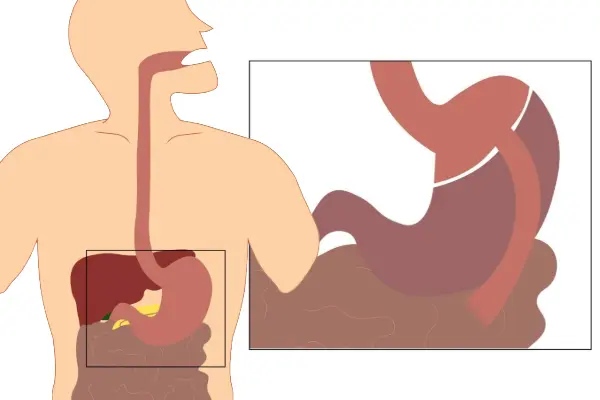
What Is Gastric Bypass Surgery?
The Roux-en-Y Gastric Bypass is one of the most effective and well-studied bariatric surgeries performed today. At BASS Bariatric Surgery Center in Walnut Creek and Brentwood, our surgeons perform this minimally invasive procedure to help patients achieve long-term weight loss and improve obesity-related health conditions.
During the surgery, the stomach is divided into two sections:
- A small upper pouch, about the size of an egg, which holds food.
- The larger lower portion, called the gastric remnant, which continues to produce digestive juices.
The small intestine is then rerouted so food flows directly from the new pouch into the mid-section of the intestine. This bypasses part of the digestive tract, reducing calorie absorption while also triggering hormonal changes that suppress hunger and improve blood sugar control.
How Gastric Bypass Promotes Weight Loss
Gastric bypass works through three powerful mechanisms:
- Restriction: The smaller stomach pouch holds far less food, helping patients feel full with much smaller portions.
- Malabsorption: Rerouting part of the small intestine limits how many calories and nutrients are absorbed.
- Hormonal Changes: The surgery reduces production of appetite-stimulating hormones like ghrelin, making it easier to control hunger.
This combination makes gastric bypass one of the most successful weight-loss surgeries, with patients often losing 60–80% of excess body weight within the first 18 months after surgery.
Health Benefits Beyond Weight Loss
Gastric bypass is not just about shedding pounds — it can transform your overall health. Studies show that the procedure:
- Leads to remission of Type 2 Diabetes in many patients.
- Lowers blood pressure and cholesterol, reducing the risk of heart disease.
- Improves or eliminates sleep apnea.
- Decreases joint pain, acid reflux, and other obesity-related conditions.
- Helps patients live longer, healthier lives.
Who Is a Candidate for Gastric Bypass?
Gastric bypass may be the right choice if you:
- Have a BMI of 40 or higher, or a BMI of 35+ with obesity-related health conditions.
- Have tried diet, exercise, or weight-loss medications without long-term success.
- Are ready to commit to the lifestyle changes necessary for lifelong success after surgery.
At BASS Bariatric Surgery Center, our surgeons Dr. Brian Chin and Dr. Jason Moy will carefully evaluate your health, weight history, and goals to determine if gastric bypass is the right procedure for you.
What to Expect Before, During, and After Surgery
- Preparation: You will complete medical tests, meet with a dietitian, and undergo a psychological evaluation.
- The Procedure: Most gastric bypass surgeries are performed laparoscopically, meaning small incisions, less scarring, and quicker recovery.
- Recovery: Most patients return home within 1–2 days and gradually transition from liquids to solid foods.
- Long-Term Success: With proper diet, exercise, and follow-up care, gastric bypass provides long-lasting results.
Risks and Considerations
As with any surgery, gastric bypass carries risks such as infection, leaks, or nutrient deficiencies. However, under the care of our experienced bariatric surgeons, complication rates are low. Long-term follow-up and vitamin supplementation are essential for success.
Gastric Bypass vs. Other Bariatric Surgeries
Compared to gastric sleeve or adjustable gastric band, gastric bypass often results in greater weight loss and more significant improvement in diabetes. However, it is a more complex surgery, so careful consultation with your surgeon is key.
FAQs About Gastric Bypass Surgery
How much weight can I expect to lose?
Most patients lose 60–80% of their excess body weight within the first 12–18 months after surgery.
Will my diabetes improve after gastric bypass?
Yes. Many patients see immediate improvements in blood sugar, with some experiencing complete remission.
Is gastric bypass covered by insurance?
Many insurance plans cover gastric bypass if you meet medical criteria. Our team at BASS Bariatric Surgery Center will help guide you through the approval process.
How long is recovery?
Most patients return to normal activities within 2–4 weeks, depending on individual healing.
Take the First Step Toward Lasting Weight Loss
At BASS Bariatric Surgery Center, our board-certified surgeons Dr. Brian Chin and Dr. Jason Moy have performed thousands of successful weight-loss procedures. We provide comprehensive care, from pre-surgery education to long-term support, helping patients throughout Walnut Creek, Brentwood, and the East Bay Area achieve healthier, happier lives.
Call us today at (925) 940-1052 or request a consultation online to see if gastric bypass surgery is right for you.